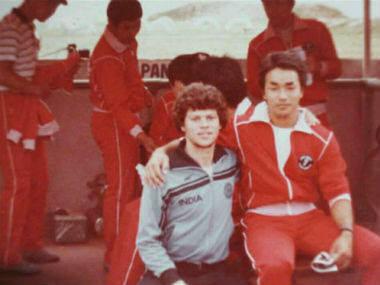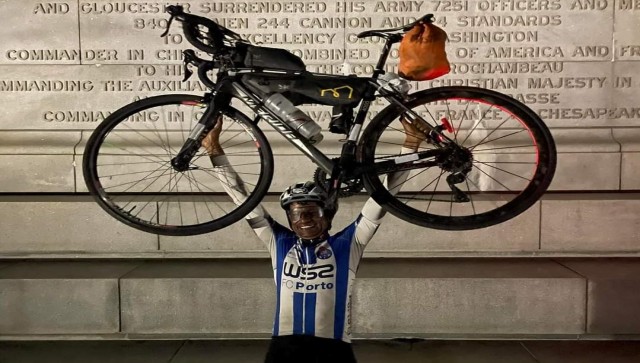The cycling velodrome at the Indira Gandhi Stadium in New Delhi is a decades old landmark. Refurbished at the cost of Rs 200 crore for the 2010 Commonwealth Games, it sits smug and extravagant. From the road that sweeps in from the Inter-State Bus Terminus at Kashmiri Gate, the velodrome is all white, a bright egg top with an arc-like structure sitting on its roof. For sci-fi buffs, it does appear like a crashed UFO that has half burrowed itself into Earth. Outside the velodrome but inside the compound, buses are leaving as the 37th Asian Cycling Championships winds down for the day. India is hosting the event; cycling is slowly trying to find it’s mojo once again in a country where homegrown riders consistently made headlines in the 70’s and early 80’s. ‘Pedalling’ had a nice and positive ring to it.
It’s dusk and amidst the traffic noise that sweeps in from the Ring Road and Vikas Marg, two of the biggest arterial roads in the nation’s capital, cyclists from diverse nations are loading their cycles onto team buses and leaving for hotels. Maxwell Trevor ventures out from the entrance, a bag on his shoulder. He has had a long day as a judge and our appointment is off by a few hours. In between he has apologised three times on the phone as events have got drawn out, twice because cyclists crashed on the track. One can forgive the former champion, a star cyclist of India. Maxwell cycled in the 80’s and early 90’s.
Those were the days when cyclists also made it to the headlines of sports pages; yes, even cyclists. He still appears fit, powerful; the cyclist’s thighs stretching the fabric of his trousers. In the 80’s those thighs powered him on the track and almost brought him close to Olympic participation. Maxwell is slightly flustered that he has kept someone waiting for close to two hours. It’s still a time-warp for Maxwell. Now top sportsperson are advised to keep journalists waiting – ‘increases brand value; don’t worry, they are used to waiting’ is what most sport agents advise top stars.
“I am surprised someone wanted to meet me,” says Maxwell, still flustered. In fact, he probably fell short of saying he thought it was a crank call, like a voice from the past waking him up telling him they still remembered. “It’s a different era now. Only the stadiums are witnesses to the 1982 Asian Games. Everything else is forgotten,” he says with a smile. Maxwell’s smile is infectious. He could have easily qualified just smiling at the track judges, all the medals won in the 1 km individual team trial secondary.
Hyderabad during the early 70’s was a hot-bed for cycling. Most Anglo-Indians either worked in the Railways or became hockey players. The rest, as hockey legend Leslie Claudius once said, “Tried to do something worthwhile.” It was the ambition of being worthwhile that made Maxwell follow in the footsteps of his elder brother Glen. If Glen won the senior sprint and time trial, Glen picked up the golds in the junior section.
Maxwell then was under 19 years of age and had been spotted by Andhra Pradesh’s famous coach Mumtaz Ahmed. Glen Trevor dominated Indian track cycling from 1977 to 81 before taking a decision that could have inspired a film in modern times. Both the brother shared one cycle and couldn’t afford a new one. So Glen, realising that Maxwell was enormously talented and could go places, gave up cycling and let Maxwell have the bicycle. “At that moment, I never understood what it means to give up on sport knowing fully well that he still could have won more titles,” says Maxwell.
The 1982 Asian Games was being hosted by India. There was an excitement in the air. “Since we were the hosts, every sport in India wanted to do well at the Games. It was an opportunity that would never come again,” felt Maxwell. By then Maxwell had made his international debut at the Asian Cycling Championships in Bangkok. He knew the competition was tough from nations like China and South Korea, but felt a medal could be won in Delhi. At the trial games before the Asiad, judges gasped when they looked at the clock – Maxwell was only short by 0.04 seconds of the Moscow Olympic gold medal winner.
The next morning across India newspapers announced the arrival of a true champion and someone who could give India its first medal in cycling since the inaugural Asian Games in 1951 when Rohinton Noble and Netai Chand Bysack had won the bronze in the sprint and 1km time trial. Maxwell, overnight was the poster boy of Indian cycling. Being an Anglo-Indian with fair skin helped. Cycling looked upon merely as a means of transport for a majority of the population had become a fad. Cycling was hip. “The medal was there for the asking,” says Maxwell. “I was doing really well and the confidence level training at your own velodrome was sky-high.”
But tragedy struck a month before the Games began in Delhi. Maxwell had fever and after a few days of thinking it was a bout of ordinary flu, he was diagnosed with dengue. Even though he was in the Asian Games team, Maxwell’s body was too weak after a three-week recovery period. India’s Danish coach Kim Rifshammer, who a couple of months before the Asian Games had said ‘Maxwell stands a chance of winning the gold’, now said it would be a miracle if he can make it to the track. Imagine, what winning an Asian Games medal could have done to the fledging career of a 19-year-old!
Having fully recovered from dengue, Maxwell broke record after record and won most of the titles at the national level. In fact, he did qualify for the 84’ Los Angeles Olympic Games but the cycling federation decided it was just too expensive to send a three-member official team with a single cyclist. Ironically, it was another Indian (though born an American), Alexi Singh Grewal who won the United States’ first gold medal in the men’s road race.
Maxwell was participating internationally and gaining experience. Winning at the national championships and various Inter-State meets was a formality but he never took winning for granted. Maxwell qualified for the 1986 Seoul Asian Games and finished 4th in the 1km individual time trial. The 4th place was more of a reminder for India of the kind of potential Maxwell had and missing the 1984 Olympics was not just a bunch of currency saved but valuable experience thrown away. At the Asian Cycling Championships in Jakarta, Maxwell finished 4th. In two years, the Asian Cycling meet would come to Delhi and it was a good time to make amends and win a medal for India. The Cycling Federation of India (CFI) decided to hold the camp at a high altitude location at Solan in Himachal Pradesh.
There Maxwell was coming downhill due a training session when he saw a patch of oil on the road and decided to avoid it. Unfortunately, he hit a rock. It was his presence of mind that he hit the brakes and was saved by not slipping and going into a 1000-foot deep gorge. 21 fractures and a dislocated shoulder later, his medal hopes at the Asian Cycling Championships had evaporated. Newspapers wondered whether a jinx hung over Maxwell’s cycling career. Maxwell recovered and won another national title. Maybe he could have gone on for another five-six years, winning medals at the national level, but he decided to quit. “I had taken everything in my stride,” says Maxwell. “Honestly, there were no regrets or complaints. After all, I was national champion for a decade.”
In any other sport, Maxwell would have easily won the Arjuna Award for which he rightfully qualified in the year 1987/88. He was the best in the country and in the top four in Asia. He was the best men’s cyclist for a full decade. “They said I was undisciplined,” says Maxwell with a smile. “You know in those days if you were friendly with a girl or even went out with someone, it was looked down upon and they said it’s not acceptable behavior.” Maxwell laughs knowing his explanation for not being nominated for an Arjuna Award from the CFI is not cutting ice. “No, believe me. They also warned me,” he says. “But I guess they had their reasons for not giving me what I surely deserved.”
It’s amazing that he still manages to keep smiling despite the fact that he could have achieved so much and that there was something always lurking around to tell him that ‘destiny’ did turn the pages of our life. “But I still can get the Arjuna Award,” he says with a wry smile. “Can’t I? Maybe, I can petition the federation once again to nominate me, who knows?” Only three people – Amar Singh, Minati Mohapatra and Armin Arethna —have won the Arjuna Award for cycling.
In 1991, Glen was murdered—the man responsible for making Maxwell a multiple-time National champion was stabbed to death. “It’s so stupid,” says Maxwell. “Thieves had entered our house. They probably thought we were rich as we were always travelling abroad for competitions. Glen challenged the thief and in the scuffle, he was stabbed.” Maxwell and a few others rushed Glen to the Railway hospital but they were on strike and by the time they reached Gandhi Hospital, Glen had passed away. “The man who motivated me was no more,” says Maxwell. “He identified me as someone who would do better than him and he gave up cycling.”
Anglo-Indian families in Hyderabad were leaving for Australia, USA, Canada and New Zealand. He himself, once made up his mind to leave but couldn’t. “India has given me everything,” he says. Maxwell’s son studies in Australia while his daughter is getting ready to leave for higher studies too.
Maxwell believes there is huge potential in cycling. He did initially come and work with the federation in 2003-04, but looking at the politics in the sport left in 2006. He had made up his mind never to come back but four years back the CFI Secretary General Onkar Singh called and asked Maxwell to come and work with the federation. Maxwell initially declined. Then his old coach Mumtaz Ahmed called from the United States and told Maxwell to give back something to the game and Maxwell agreed.
The buses are leaving and dusk has rolled into night. Cyclists are looking out of the windows. Somebody from the near the buses is yelling ‘Maxwell, Maxwell’. Apparently, the hotel is a good one hour drive away. Maxwell hurries. He doesn’t want to lose his ride. Hurriedly saying thank you, he runs. Persist is the word that he leaves in his wake. And that endearing half blush, half smile. Maybe, they will still give him his Arjuna Award. Maxwell ‘persist’ Trevor should have been his name.


)




)
)
)
)
)
)
)
)